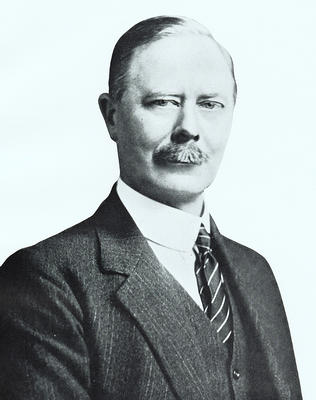
Sir James Lithgow (1883-1952), shipbuilder and industrialist.
With his brother Henry, James Lithgow took control of the family shipbuilding business in Port Glasgow on the death of their father in 1908. Lithgows prospered, and diversified into coal, steel and marine engineering. In 1935 the firm took over Fairfield Shipbuilding & Engineering Co, which was in danger of failing.
Lithgow was also prominent in public service. He was responsible for the management of the nation's shipbuilding programmes in two world wars, being appointed Director of Merchant Shipbuilding in 1917, and Controller of Merchant Shipbuilding and Repairs in 1940. As spokesman for National Shipbuilders Security Ltd in the 1930s he had to defend the policy of rationalisation, which meant buying shipyards in order to close them down to reduce national capacity. Several Clyde yards were affected. As chairman of the Scottish National Development Council, Lithgow played a leading role in the promotion of Hillington Industrial Estate and the Empire Exhibition of 1938.
Reference: Mitchell Library, G 623.809 FAI
Reproduced with the permission of Glasgow City Council, Libraries Information and Learning
Keywords:
Empire Exhibition, Fairfield Shipbuilding & Engineering Co, First World War, Hillington Industrial Estate, Lithgows, marine engineering, National Shipbuilders Security Ltd, rationalisation, Scottish National Development Council, Second World War, shipbuilders, shipbuilding, shipyards
You have 0 images in your photo album.